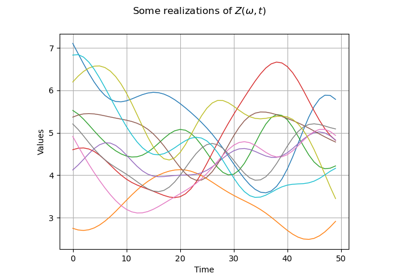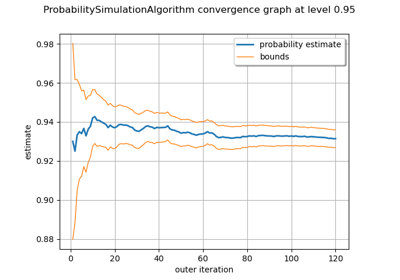ProcessEvent¶
- class ProcessEvent(*args)¶
Event defined from a process and a domain.
The event occurs when the process enters the specified domain.
See also
Examples
>>> import openturns as ot >>> dim = 2 >>> dist = ot.Normal(dim) >>> X = ot.WhiteNoise(dist) >>> domain = ot.Interval(dim) >>> event = ot.ProcessEvent(X, domain)
Methods
If the random vector can be viewed as the composition of several
ThresholdEventobjects, this method builds and returns the composition.Accessor to the antecedent RandomVector in case of a composite RandomVector.
Accessor to the object's name.
Accessor to the covariance of the RandomVector.
Accessor to the description of the RandomVector.
Accessor to the dimension of the RandomVector.
Accessor to the distribution of the RandomVector.
Accessor to the domain of the Event.
getFrozenRealization(fixedPoint)Compute realizations of the RandomVector.
getFrozenSample(fixedSample)Compute realizations of the RandomVector.
Accessor to the Function in case of a composite RandomVector.
getMarginal(*args)Get the random vector corresponding to the
marginal component(s).
getMean()Accessor to the mean of the RandomVector.
getName()Accessor to the object's name.
Accessor to the comparaison operator of the Event.
Accessor to the parameter of the distribution.
Accessor to the parameter description of the distribution.
Get the stochastic process.
Compute one realization of the RandomVector.
getSample(size)Compute realizations of the RandomVector.
Accessor to the threshold of the Event.
hasName()Test if the object is named.
Accessor to know if the RandomVector is a composite one.
isEvent()Whether the random vector is an event.
setDescription(description)Accessor to the description of the RandomVector.
setName(name)Accessor to the object's name.
setParameter(parameters)Accessor to the parameter of the distribution.
- __init__(*args)¶
- asComposedEvent()¶
If the random vector can be viewed as the composition of several
ThresholdEventobjects, this method builds and returns the composition. Otherwise throws.- Returns:
- composed
RandomVector Composed event.
- composed
- getAntecedent()¶
Accessor to the antecedent RandomVector in case of a composite RandomVector.
- Returns:
- antecedent
RandomVector Antecedent RandomVector
in case of a
CompositeRandomVectorsuch as:.
- antecedent
- getClassName()¶
Accessor to the object’s name.
- Returns:
- class_namestr
The object class name (object.__class__.__name__).
- getCovariance()¶
Accessor to the covariance of the RandomVector.
- Returns:
- covariance
CovarianceMatrix Covariance of the considered
UsualRandomVector.
- covariance
Examples
>>> import openturns as ot >>> distribution = ot.Normal([0.0, 0.5], [1.0, 1.5], ot.CorrelationMatrix(2)) >>> randomVector = ot.RandomVector(distribution) >>> ot.RandomGenerator.SetSeed(0) >>> print(randomVector.getCovariance()) [[ 1 0 ] [ 0 2.25 ]]
- getDescription()¶
Accessor to the description of the RandomVector.
- Returns:
- description
Description Describes the components of the RandomVector.
- description
- getDimension()¶
Accessor to the dimension of the RandomVector.
- Returns:
- dimensionpositive int
Dimension of the RandomVector.
- getDistribution()¶
Accessor to the distribution of the RandomVector.
- Returns:
- distribution
Distribution Distribution of the considered
UsualRandomVector.
- distribution
Examples
>>> import openturns as ot >>> distribution = ot.Normal([0.0, 0.0], [1.0, 1.0], ot.CorrelationMatrix(2)) >>> randomVector = ot.RandomVector(distribution) >>> ot.RandomGenerator.SetSeed(0) >>> print(randomVector.getDistribution()) Normal(mu = [0,0], sigma = [1,1], R = [[ 1 0 ] [ 0 1 ]])
- getDomain()¶
Accessor to the domain of the Event.
- Returns:
- domain
Domain Describes the domain of an event.
- domain
- getFrozenRealization(fixedPoint)¶
Compute realizations of the RandomVector.
In the case of a
CompositeRandomVectoror an event of some kind, this method returns the value taken by the random vector if the root cause takes the value given as argument.- Parameters:
- fixedPoint
Point Point chosen as the root cause of the random vector.
- fixedPoint
- Returns:
- realization
Point The realization corresponding to the chosen root cause.
- realization
Examples
>>> import openturns as ot >>> distribution = ot.Normal() >>> randomVector = ot.RandomVector(distribution) >>> f = ot.SymbolicFunction('x', 'x') >>> compositeRandomVector = ot.CompositeRandomVector(f, randomVector) >>> event = ot.ThresholdEvent(compositeRandomVector, ot.Less(), 0.0) >>> print(event.getFrozenRealization([0.2])) [0] >>> print(event.getFrozenRealization([-0.1])) [1]
- getFrozenSample(fixedSample)¶
Compute realizations of the RandomVector.
In the case of a
CompositeRandomVectoror an event of some kind, this method returns the different values taken by the random vector when the root cause takes the values given as argument.- Parameters:
- fixedSample
Sample Sample of root causes of the random vector.
- fixedSample
- Returns:
- sample
Sample Sample of the realizations corresponding to the chosen root causes.
- sample
Examples
>>> import openturns as ot >>> distribution = ot.Normal() >>> randomVector = ot.RandomVector(distribution) >>> f = ot.SymbolicFunction('x', 'x') >>> compositeRandomVector = ot.CompositeRandomVector(f, randomVector) >>> event = ot.ThresholdEvent(compositeRandomVector, ot.Less(), 0.0) >>> print(event.getFrozenSample([[0.2], [-0.1]])) [ y0 ] 0 : [ 0 ] 1 : [ 1 ]
- getFunction()¶
Accessor to the Function in case of a composite RandomVector.
- Returns:
- function
Function Function used to define a
CompositeRandomVectoras the image through this function of the antecedent:
.
- function
- getMarginal(*args)¶
Get the random vector corresponding to the
marginal component(s).
- Parameters:
- iint or list of ints,
Indicates the component(s) concerned.
is the dimension of the RandomVector.
- iint or list of ints,
- Returns:
- vector
RandomVector RandomVector restricted to the concerned components.
- vector
Notes
Let’s note
a random vector and
a set of indices. If
is a
UsualRandomVector, the subvector is defined by. If
is a
CompositeRandomVector, defined bywith
,
some scalar functions, the subvector is
.
Examples
>>> import openturns as ot >>> distribution = ot.Normal([0.0, 0.0], [1.0, 1.0], ot.CorrelationMatrix(2)) >>> randomVector = ot.RandomVector(distribution) >>> ot.RandomGenerator.SetSeed(0) >>> print(randomVector.getMarginal(1).getRealization()) [0.608202] >>> print(randomVector.getMarginal(1).getDistribution()) Normal(mu = 0, sigma = 1)
- getMean()¶
Accessor to the mean of the RandomVector.
- Returns:
- mean
Point Mean of the considered
UsualRandomVector.
- mean
Examples
>>> import openturns as ot >>> distribution = ot.Normal([0.0, 0.5], [1.0, 1.5], ot.CorrelationMatrix(2)) >>> randomVector = ot.RandomVector(distribution) >>> ot.RandomGenerator.SetSeed(0) >>> print(randomVector.getMean()) [0,0.5]
- getName()¶
Accessor to the object’s name.
- Returns:
- namestr
The name of the object.
- getOperator()¶
Accessor to the comparaison operator of the Event.
- Returns:
- operator
ComparisonOperator Comparaison operator used to define the
RandomVector.
- operator
- getParameter()¶
Accessor to the parameter of the distribution.
- Returns:
- parameter
Point Parameter values.
- parameter
- getParameterDescription()¶
Accessor to the parameter description of the distribution.
- Returns:
- description
Description Parameter names.
- description
- getProcess()¶
Get the stochastic process.
- Returns:
- process
Process Stochastic process used to define the
RandomVector.
- process
- getRealization()¶
Compute one realization of the RandomVector.
- Returns:
- realization
Point Sequence of values randomly determined from the RandomVector definition. In the case of an event: one realization of the event (considered as a Bernoulli variable) which is a boolean value (1 for the realization of the event and 0 else).
- realization
See also
Examples
>>> import openturns as ot >>> distribution = ot.Normal([0.0, 0.0], [1.0, 1.0], ot.CorrelationMatrix(2)) >>> randomVector = ot.RandomVector(distribution) >>> ot.RandomGenerator.SetSeed(0) >>> print(randomVector.getRealization()) [0.608202,-1.26617] >>> print(randomVector.getRealization()) [-0.438266,1.20548]
- getSample(size)¶
Compute realizations of the RandomVector.
- Parameters:
- nint,
Number of realizations needed.
- nint,
- Returns:
- realizations
Sample n sequences of values randomly determined from the RandomVector definition. In the case of an event: n realizations of the event (considered as a Bernoulli variable) which are boolean values (1 for the realization of the event and 0 else).
- realizations
Examples
>>> import openturns as ot >>> distribution = ot.Normal([0.0, 0.0], [1.0, 1.0], ot.CorrelationMatrix(2)) >>> randomVector = ot.RandomVector(distribution) >>> ot.RandomGenerator.SetSeed(0) >>> print(randomVector.getSample(3)) [ X0 X1 ] 0 : [ 0.608202 -1.26617 ] 1 : [ -0.438266 1.20548 ] 2 : [ -2.18139 0.350042 ]
- getThreshold()¶
Accessor to the threshold of the Event.
- Returns:
- thresholdfloat
Threshold of the
RandomVector.
- hasName()¶
Test if the object is named.
- Returns:
- hasNamebool
True if the name is not empty.
- isComposite()¶
Accessor to know if the RandomVector is a composite one.
- Returns:
- isCompositebool
Indicates if the RandomVector is of type Composite or not.
- isEvent()¶
Whether the random vector is an event.
- Returns:
- isEventbool
Whether it takes it values in {0, 1}.
- setDescription(description)¶
Accessor to the description of the RandomVector.
- Parameters:
- descriptionstr or sequence of str
Describes the components of the RandomVector.
- setName(name)¶
Accessor to the object’s name.
- Parameters:
- namestr
The name of the object.
- setParameter(parameters)¶
Accessor to the parameter of the distribution.
- Parameters:
- parametersequence of float
Parameter values.
Examples using the class¶

Create a process from random vectors and processes
 OpenTURNS
OpenTURNS

